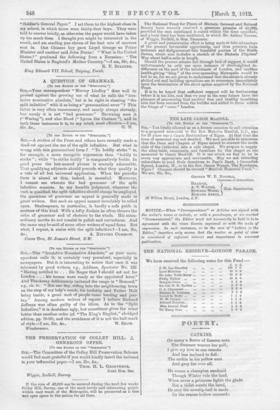[To THE EMTOE OP THE SPEOTATOP.."] Sin,—The "Irrelative Nominative Absolute,"
as your corre- spondent calls it, is certainly very prevalent, especially in newspapers. But it is interesting to notice that once it was tolerated by good writers, e.g., Addison, Spectator No. 132. "Having notified to . . . Sir Roger that I should set out for London . . . his horses were ready at the appointed hour." And Thackeray deliberately imitated the usage in "Esmond," e.g., oh. iv. "But one day, riding into the neighbouring town on the step of my lady's coach, his lordship and Father Holt being inside, a great mob of people came hooting and jeer- ing." Among modern writers of repute I believe Richard Jeffreys was often guilty of the idiom. As to the "Split Infinitive," it is doubtless ugly, but sometimes gives the sense better than another order (cf. "The King's English," abridged edition, pp. 79-80), and the avoidance of it is not the hall-mark










































 Previous page
Previous page